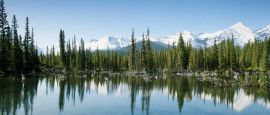Horseshoe Lake, Patricia Lake and Lake Annette are three of the more popular alpine diving locations. Divers should be experienced and employ the 'buddy' system as the water is cold and often cloudy. The local Rangers Station supplies permits, maps and other information.
Alberta things to see and do
Tourist offices
Address: PO Box 2500, Edmonton, AB, Canada
Tel: +1 780 427 4321.
www.travelalberta.com
You can study dinosaur remains on the banks of the Red Deer River, on the 48km (30-mile) Dinosaur Trail near Drumheller. Also near downtown Drumheller is the Royal Tyrrell Museum of Palaeontology, with hands-on exhibitions and one of the world's largest collections of dinosaur remains.
Alberta's biggest showcase of the arts (with dance, theatre, film, music and art) takes place over four months annually, all amidst the stunning backdrop of the Rocky Mountains.
Canada's biggest rodeo is billed as the 'Greatest Outdoor Show on Earth'; it is held over 10 days in July each year (www.calgarystampede.com) and attracts many competitors and spectators with stage shows, parades, concerts, rodeo and agricultural exhibits.
Calgary's most recognisable feature, the 191m (626ft) Calgary Tower, offers panoramic views of the city, local towns and the Rocky Mountains. Sky 360, the rotating restaurant at the top, is a popular treat (www.sky360.ca).
The heritage of ranching is alive and well in the town of Cochrane, west of Calgary. Country-and-western-themed shops pepper the downtown area and genuine cowboys still live and work in the region.
You'll find Alberta's oldest surviving structure, the historic log cabin of Father Lacombe, in the town of St Albert, 30km (19 miles) northwest of downtown Edmonton. At one time it was the centre of a thriving French-speaking Métis settlement (people of mixed native and European heritage).
Jasper National Park was established in 1907 and is the largest of Canada's Rocky Mountains parks, spanning 10,878 sq kilometres (4200 sq miles). The spectacular scenery is characterised by glaciers, rugged mountains, forests and meadows carpeted with alpine flowers. The park protects a range of fragile mountain ecosystems - elk, moose, bear, bighorn sheep and mule deer are regular sights - and is home to the threatened woodland caribou. Maligne Lake, 48km (30 miles) southeast of Jasper is surrounded by snow-capped mountains and its crystal clear waters are popular for boating and fishing.
Alberta boasts characteristic Canadian views: stunning lake scenery in Waterton Lakes National Park, joined to Glacier National Park in Montana to form the Waterton-Glacier International Peace Park; and Banff National Park in the heart of the Canadian Rockies.
The great outdoors is the main attraction in the southern part of the Rockies; Banff and Jasper national parks are obvious starting points.
The name sounds horrific but the prairie views are unparalleled at Head-Smashed-In Buffalo Jump, west of Lethbridge. This cliff-top is an ancient jump site, used for 10,000 years to drive buffalo to their deaths, thus providing native people with food, shelter and clothing.
Skiing, both cross-country and downhill, is a major pastime in the Rockies in the winter. Snowboarding is also very popular.
The Icefields Parkway (Highway 93), running through Banff and Jasper national parks, affords magnificent views of the lakes, forests and the glaciers of the Columbia Icefield. It also provides access to wilderness trails in the area.
North America's largest entertainment centre and mall, the West Edmonton Mall (www.wem.ca), boasts theatres, restaurants, nightclubs, miniature golf course, ice rink, swimming pool, water park and amusement park, skateboard park, aquariums and bungee jump.
There are myriad ways to enjoy the wonderful mountain scenery, including dog sledding (trekking along mountain trails with teams of huskies under the supervision of experienced guides), ski-joring (being pulled along on skis by teams of huskies), wildlife tracking, snowmobiling and snowshoeing.
Elk Island National Park (www.pc.gc.ca/elkisland), which traces its roots to 1906, is home to over 44 different kinds of animals (including elk, moose, coyote and beaver), as well as massive herds of plains bison.
Vast expanses of boreal plains are yours to discover at Wood Buffalo National Park (www.pc.gc.ca/woodbuffalo) (Canada's largest national park, bigger than Switzerland), granted World Heritage status by UNESCO in 1983. It provides the perfect habitat for many rare species of wildlife, including the world's largest free-roaming bison herd.
Do you have any Feedback about this page?
© 2026 Columbus Travel Media Ltd. All rights reserved. No part of this site may be reproduced without our written permission, click here for information on Columbus Content Solutions.








 You know where
You know where